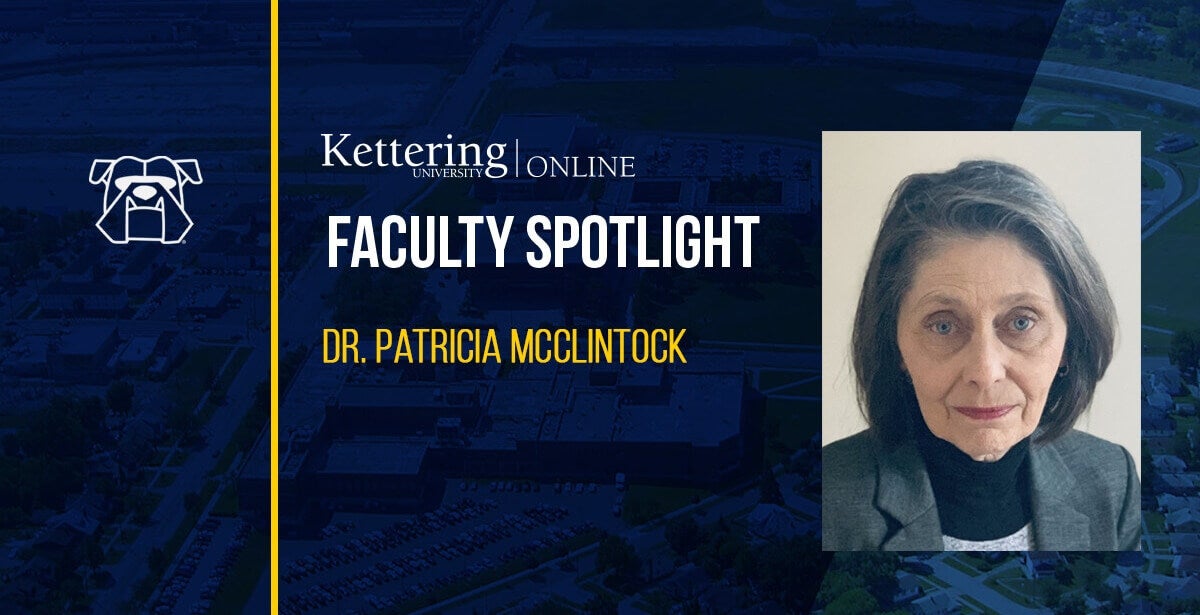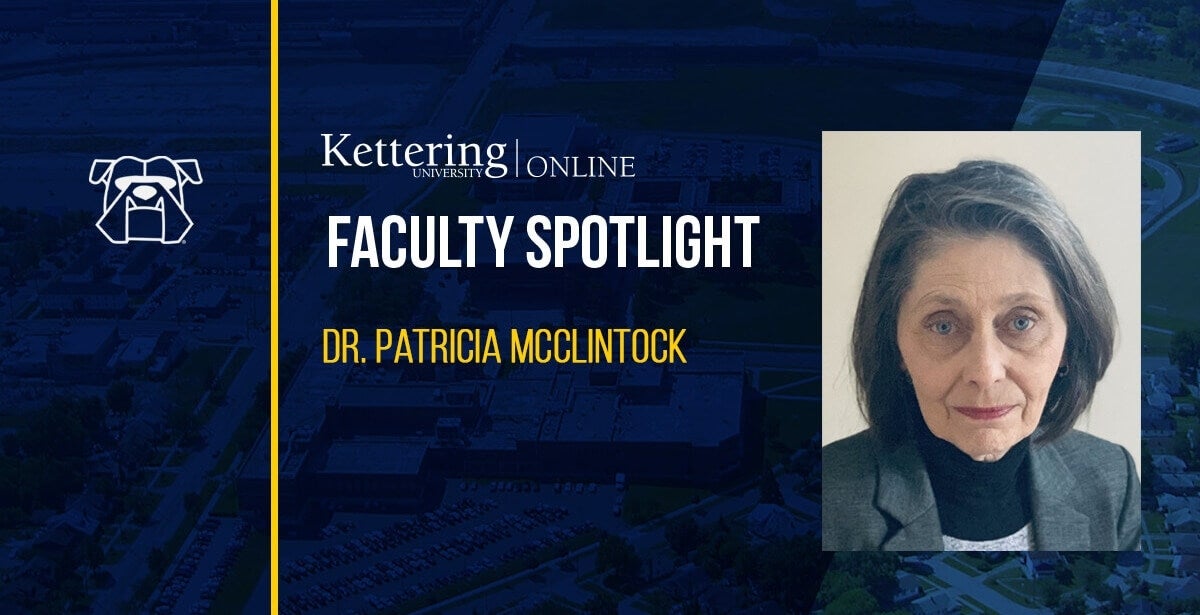
Faculty Spotlight: Dr. Patricia McClintock
By Jennifer Levy, M.A.
Program Development Manager/Senior Instructional Designer
Kettering Global
As Kettering University Online’s (KUO) Program Development Manager and Senior Instructional Designer, I have the pleasure of working with our contributing faculty members, and faculty mentors, many of whom are subject matter experts for the courses they teach. Coming from a wide range of educational, career, and geographical backgrounds, KUO faculty unite in the effort to link transformative experiential education to rigorous academic standards with real-world applications for learning that lasts a lifetime.
This time, we are happy to shine the Faculty Spotlight on KUO Faculty Mentor, Dr. Patricia McCLintock. Dr. McClintock has been working in online education for over 20 years. She has been a Contributing Faculty member and Faculty Mentor with KUO since its inception six years ago. I was delighted that she made some time in her busy schedule to tell me a bit about herself. Following are excerpts from our conversation:
Jennifer Levy: First, thanks so much for making the time to chat.
Patricia McCLintock: My pleasure.
Jennifer Levy: Where did you grow up?
Patricia McCLintock: I grew up in the Midwest, near Chicago. I lived briefly in California and Colorado, but am a total Midwesterner at heart.
Jennifer Levy: What degrees do you have and from where?
Patricia McCLintock: I have a bachelor’s degree in speech communication from Northern Illinois University. My master’s degree is in education with a specialization in curriculum and instruction from the University of St. Francis in Joliet, Illinois. My doctoral degree is also in education with a specialization in e-learning and teaching which I received from Northcentral University in Prescott, Arizona.
Jennifer Levy: In brief, what is your teaching philosophy?
Patricia McCLintock: My teaching philosophy is fundamentally student-centered, which means I meet the student where he or she is academically. I believe in the necessity of addressing everyone in the class at his or her own level of expertise. Then, my job as a facilitator is to lead the class toward academic and personal growth and the realization of individual potential. My approach is centered in interdisciplinary formats so once I make a connection to a student, my philosophy of teaching underscores the importance of making connections to other fields of knowledge. My goal is for students to develop a thirst for seeking and acquiring knowledge so they will have the essential skills necessary to solve the problems they will encounter in their professional and personal futures. I sincerely hope they enjoy and find value in class and my job is to help make that happen.
Jennifer Levy: Most people have heard of the concept of pedagogy, which refers to the method, and practice of teaching as well as the interaction between and the relationship among teachers, students, and the learning material. Can you briefly explain the concept of andragogy?
Patricia McCLintock: Andragogy is the practice of teaching adult learners whereas pedagogy usually refers to younger learners. I view my role as a facilitator of the adult learning experience in terms of Malcolm Knowles’ popularization of andragogy, which can be summarized as the “guide on the side” rather than “the sage on the stage.” This methodology includes leveraging the student experience to help them connect with the course material, inspiring them to be responsible for their learning, and helping them to structure the material to be relevant and applicable to their world. Learning for adults occurs when they find value in the material that they can immediately apply, or envision applying, to their life and/or work. Within the framework of the course, I wish to provide flexibility for learners to make the material most useful to each of them while meeting the learning objectives.
Jennifer Levy: What surprised you most about teaching online vs. face to face?
Patricia McCLintock: Initially, what surprised me about teaching online vs. face to face was the very candid and open communication displayed among the learners. It does make sense though, because online learning can erase social, gender, and economic inequalities. The online classroom becomes a level playing field and reduces possible bias, which could inhibit learner participation in a face-to-face classroom.
Jennifer Levy: As a Faculty Mentor for KUO, what advice would you give someone who is about to teach their first online course?
Patricia McCLintock: The best advice I can offer to new contributing faculty members is to know KUO’s policies and follow them to the letter. Also, as facilitators, it is their job to be approachable while creating a sense of trust so that learners feel safe and secure.
Jennifer Levy: What would you say to an instructor about how to create rapport with online students?
Patricia McCLintock: I believe facilitators need to hone an online “teaching personality” that consists of treating learners as colleagues and finding ways to connect with them on both a personal and professional level. Above all, be timely in responding to them, and show a sincere interest in helping them succeed.
Jennifer Levy: What advice would you give to someone who is taking their first online course?
Patricia McCLintock: Become familiar with all the orientation materials from the institution, and seek out a colleague who is familiar with the online environment. Finding someone who has online experience, and is willing to share it, can greatly reduce the feeling of isolation that can sometimes come with the newness of taking classes in this way.
Jennifer Levy: What is the best advice a professor ever gave you?
Patricia McCLintock: The best advice I ever received is that the most important trait in being successful is not how intelligent you are, but how persistent you are. Be persistent, to a fault, to reach your academic goals.
Jennifer Levy: What do you like most about mentoring faculty?
Patricia McCLintock: I love to be able to share the online experiences I have had in the hope that it motivates and inspires new online faculty.
Jennifer Levy: Please add any particular career achievements or highlights.
Patricia McCLintock: Aside from the certifications, presentations, and recognition one often receives after a long period in higher education, the highlight for me is when a student, or colleague, tells me that I inspired or aided him or her toward a goal or achievement.
Jennifer Levy: What fun things do you like to do in your spare time?
Patricia McCLintock: I love to spend time with my family, especially cooking for them. I enjoy gardening and crafting and look forward to traveling when I retire!
Jennifer Levy: Who has influenced you the most in life?
Patricia McCLintock: My dear departed mother has probably had the most influence on me. She had a challenging life and taught me many important life lessons.
KUO honors and appreciates Dr. McCLintock for her contributions and highly regarded work with students.
At KUO, we are grounded by our past while innovating our future by designing, delivering, and supporting transformational educational experiences for a diverse global community. KUO is proud to announce that they received a perfect score, 100/100, for credentialing and training online faculty from The U.S. News & World Report Best Colleges Rankings for 2018!
If you are interested in becoming a student, visit Kettering University Online for information about our graduate degree programs or contact an Advisor now!

